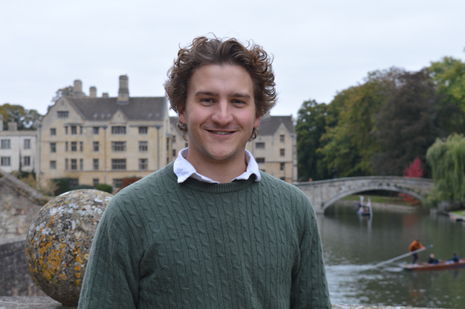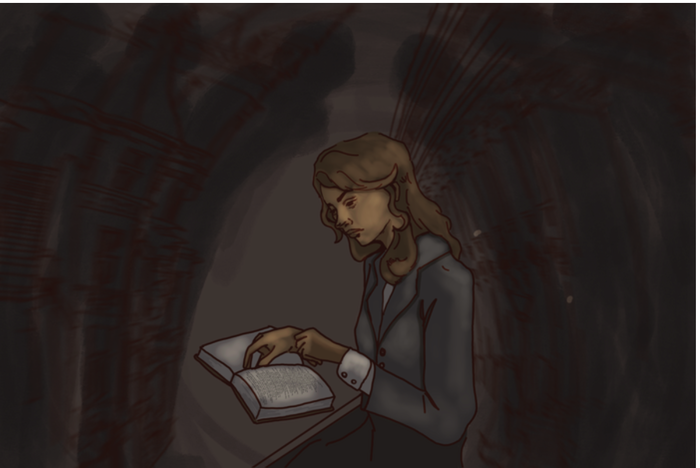How Thomas Godfrey is fighting anti-intellectualism
Ludovica de Lorenzo speaks to the Dante expert about the realities of academia

It’s fall and Clare River Room Cafe is a marvellous place for sociability and tasty cups of tea. During an afternoon at the start of term, Thomas Godfrey explains his vision of academia, anti-intellectualism, and knowledge. After having studied at Durham as an undergraduate and at Oxford as a masters student, Godfrey is now undertaking a PhD in Italian, with a particular focus on Dante, at Clare College. But had he always known where he fitted in as an academic, or did his purpose develop over the years?
“Before my PhD,” he explains, sipping his tea, “I wasn’t sure about what to do with my future career. I spent a year travelling abroad, discovering new places and people. I understood what I truly wanted to do in the future when I met passionate lecturers that made me fall in love with my field of studies. However, I would have never imagined I would have researched Dante!”.
“Academia doesn’t necessarily have to be aesthetically pleasing”
Godfrey also uses his social media as a tool to fight the anti-intellectualism that is rising day by day against the humanities. He explains that though he could have just done research, he ended up joining in public debate: “I started posting content almost as a digital diary. Then, through engaging with people, I understood that my field of studies as well as academia was perceived as interesting.”
Godfrey feels that people sometimes fall in the trap of over romanticising academia. “Many people idealise academia reading The Secret History, which of course is a compelling book, but it is important to bear in mind that academia doesn’t necessarily have to be aesthetically pleasing”. “This is what I try to explain through my content,’’ he tells me.“But I can’t deny what I learnt though Dead Poets Society: poetry, beauty, and romance is what we stay alive for.” He speaks about his work against anti-intellectualism with clarity and frankness: “I always argue that just because something is not directly useful, as for instance engaging with medieval manuscripts, that doesn’t mean that it’s useless.”
“The more people read and train their intellectual sensitivity, the more they develop empathy and passion”
Hatred of humanities continues to grow, but Godfrey admits he hasn’t always noticed it. “When I was an undergraduate, I didn’t perceive any hint of this phenomenon, perhaps because of the excitement for my studies. When I came back from my year abroad, I started to notice that my friends who studied humanities started to apply for jobs that were far from their degree field, caring more about their income rather than their passions. It’s a shame that people claim that it’s impossible to make an income from humanities, especially because music, movies, entertainment, and novels all come from that basis. Also, I think the job market is indiscriminately tough in every field.”
To destroy this prejudice, Godfrey argues that students and young people should keep engaging with the arts: “Reading, writing, and debating are the keys to fight close-mindedness and anti-intellectualism. The more people read and train their intellectual sensitivity, the more they develop empathy and passion. Writing allows clarity of thoughts and creates peace of mind. Discussing is another tool that allows exchange of different ideas and constructive criticism.”
Asked how he is individually contributing to this cause, he explains: “I try to read and learn things that are out of my background so that I integrate new ways of thinking. I also discuss my ideas with people that don’t have the same opinion as mine. Anytime I see debates, even the nonsense ones that take place online, I am glad that they exist because this means that people still want to share their opinions and listen to what others think.”
Debates are similar to socratic interactions, in which lessons are taught through discussion. “When I was teaching in Italy I was surprised by the Italian system that trained oral speaking. It helped students express their thoughts out loud. If the Italian school of rhetoric was blended with the British system of writing, that would be the ideal education.”
To all the students that are anxious about finding a career in humanities or pursuing their studies, Godfrey extends a piece of advice: “Sometimes, it is ideal to stick to Petrarch’s ‘Vita Contemplativa’, detaching from superfluous needs and learning not just for the sake of achieving things, but to grow and appreciate all that happens.” He reminds us that curiosity is the most helpful weapon against intellectual indifference.
 News / Colleges charge different rents for the same Castle Street accommodation2 March 2026
News / Colleges charge different rents for the same Castle Street accommodation2 March 2026 News / King’s hosts open iftar for Ramadan3 March 2026
News / King’s hosts open iftar for Ramadan3 March 2026 Theatre / Lunatics and leisure centres 4 March 2026
Theatre / Lunatics and leisure centres 4 March 2026 News / Angela Merkel among Cambridge honorary degree nominees27 February 2026
News / Angela Merkel among Cambridge honorary degree nominees27 February 2026 News / News in Brief: waterworks, wine woes, and workplace wins 1 March 2026
News / News in Brief: waterworks, wine woes, and workplace wins 1 March 2026








